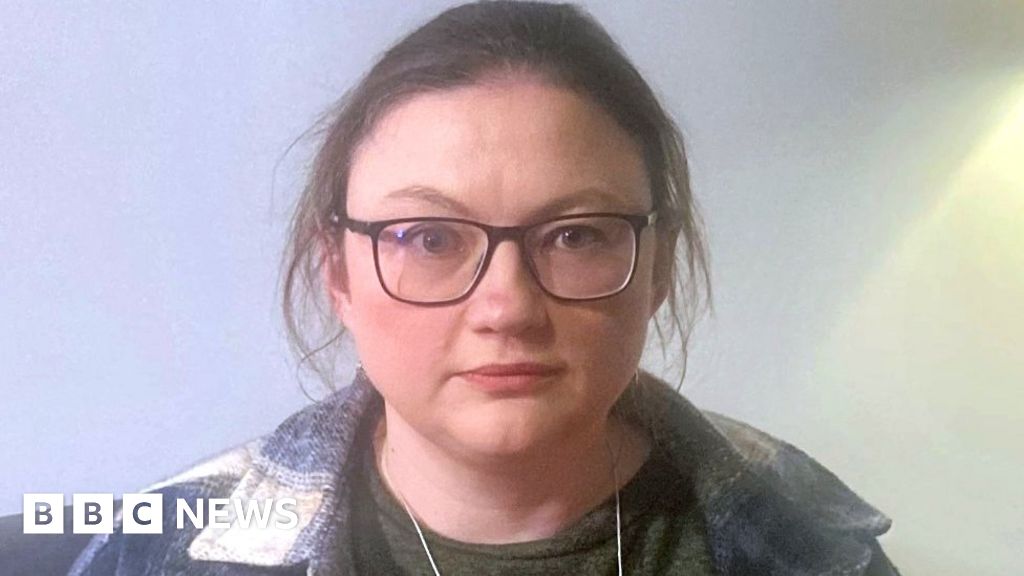- Written by Rebecca Logan & Marie-Louise Connolly
- BBC NI News
Tara Maguire shared her terrifying experience of postpartum psychosis that led to her being admitted to a general mental health unit
A mother who asked her husband if she should suffocate her baby while suffering from postnatal psychosis said there was a “huge need” to open a dedicated mother and baby mental health unit (MBU) in Northern Ireland.
Tara Maguire said she heard a voice say her baby was “supposed to be in heaven” a few days after giving birth.
Tara was admitted to the hospital’s general psychiatric ward.
She is speaking after the announcement of Northern Ireland’s first MBU.
The Department of Health (DoH) said the MBU would be based at Belfast City Hospital.
This unit was first proposed 15 years ago.
The move only confirmed the location, but other details such as project funding and staffing were not disclosed.
It will provide a dedicated in-patient service for women with serious post-natal mental health problems, and allow mothers with infants to be admitted and treated.
Northern Ireland is currently the only region in the UK without a dedicated MBU.
Tara, who has two children, said she had always planned to start a family but had no idea how mental illness would affect her physical and mental health.
“Out of elation, there was a voice in my head telling me my baby was too beautiful for this world and should be in heaven,” she said.
“In my darkest moment, I said to my husband, Chris, ‘Maybe we should consider smothering the baby now?’
Their daughter, Maisie, now two-and-a-half years old, had been separated from her mother for three weeks when Tara was admitted to hospital.
Meanwhile, Tara was pumping breast milk, which had to be thrown away because it was high in antipsychotic drugs.
Although she was allowed one visit a day, she was sometimes unable to physically see her family.
What is postpartum psychosis?
- A rare but serious mental illness that can affect any new mother.
- Symptoms may include hallucinations, delusions, manic and depressive mood, loss of inhibitions, restlessness, out-of-character behavior and confusion.
- If left untreated, the condition can deteriorate rapidly and the mother may harm the baby, herself, or others.
- Treatment options include mother-baby unit care, medication, cognitive behavioral therapy (CBT), and electroconvulsive therapy.
- The most severe symptoms usually last 2 to 12 weeks, but recovery may take several months
Her husband, Chris, said the system is disjointed and broken.
“My right hand didn’t know what my left hand was doing,” he said.
“The community support team didn’t know what the hospital team was doing, and vice versa.”
Chris said the care provided was “full of holes” and “grossly ill-equipped to deal with this type of situation”.
He said witnessing his wife’s illness was “unsettling and traumatic” and that he “saw the fear in her eyes” but could do nothing to help her.
The family was given a card with a helpline number on it when they left the hospital after Maisie’s birth, but Chris said she never thought she would need to use it.
“The first time I heard the words ‘postpartum psychosis’ was when I called the number at 4:15am.
“I learned more in that 15-minute call than I had in the week before.
“Nobody ever thought to tell me this, Tara was completely unaware, I needed to know.
“The service is not ready yet. My wife is a statistic, but that’s not enough.
“If we had lived in the UK, she would have had a completely different experience, the baby would have had a better experience and the bond would have been stronger.
“We’ve worked hard to make that connection, but that burden shouldn’t be placed on families. That’s why we provide health care services.”
Northern Ireland’s first MBU unit to be based at Belfast City Hospital
All five health and social care trusts have community perinatal mental health teams that provide support and intervention for women during pregnancy and up to the first year of life.
DoH permanent secretary Peter May said: “Belfast Trust will now begin preparing the business case for a proposed regional unit on the site of Belfast City Hospital.”
“While this is a very positive step, the reality is that we are operating in very difficult financial conditions.
“The timeline for unit delivery is therefore dependent on our ability to identify the necessary funding to construct and operate the new facility.”
